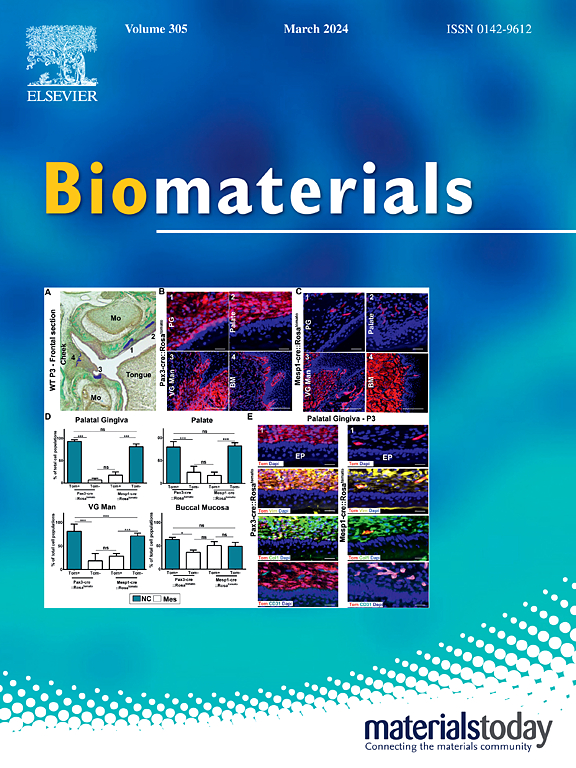Mesoporous polydopamine nanoparticle-based tolerogenic vaccine induces antigen-specific immune tolerance to prevent and treat autoimmune multiple sclerosis
IF 12.9
1区 医学
Q1 ENGINEERING, BIOMEDICAL
引用次数: 0
Abstract
Multiple sclerosis (MS) is a chronic neurological disorder derived from autoreactive immune system attacking the protective myelin sheath that surrounds nerves in the central nervous system (CNS). Here, a tolerogenic nanovaccine for generating an antigen-specific immune tolerance for treating MS is proposed. It consisted of a mesoporous polydopamine (mPDA) nanoparticle, characterized by high reactive oxygen species (ROS)-scavenging property, loaded with MS-derived autoantigen. Intravenous vaccination of autoantigen-loaded mPDA could induce tolerogenic dendritic cells (DCs) with low expression of co-stimulatory molecules while presenting peptide epitopes. The tolerogenic DCs induced peripheral regulatory T-cells (Tregs), thereby reducing infiltration of autoreactive CD4+ T-cells and inflammatory antigen-presenting cells (APCs) into the CNS. In MS-mimicking mouse model, the tolerogenic nanovaccine prevented MS development in the early therapeutic setup and exhibited an enhanced recovery from complete paralysis in the late therapeutic model. The current platform could be exploited to treat other autoimmune diseases where disease-dependent autoantigen peptides are delivered.

介孔聚多巴胺纳米颗粒耐受性疫苗诱导抗原特异性免疫耐受预防和治疗自身免疫性多发性硬化。
多发性硬化症(MS)是一种慢性神经系统疾病,源于自身反应性免疫系统攻击中枢神经系统(CNS)神经周围的保护性髓鞘。本文提出了一种耐受性纳米疫苗,用于产生抗原特异性免疫耐受性来治疗多发性硬化症。它由介孔聚多巴胺(mPDA)纳米颗粒组成,具有高活性氧(ROS)清除性能,负载ms衍生的自身抗原。静脉注射装载自身抗原的mPDA可诱导耐受源性树突状细胞(dc)低表达共刺激分子,同时呈现肽表位。耐受性dc诱导外周调节性t细胞(Tregs),从而减少自身反应性CD4+ t细胞和炎症抗原呈递细胞(APCs)进入中枢神经系统的浸润。在模拟多发性硬化症的小鼠模型中,耐受性纳米疫苗在早期治疗设置中阻止了多发性硬化症的发展,并在晚期治疗模型中显示出从完全瘫痪中恢复的增强。目前的平台可以用于治疗其他自身免疫性疾病,其中疾病依赖的自身抗原肽被递送。
本文章由计算机程序翻译,如有差异,请以英文原文为准。
求助全文
约1分钟内获得全文
求助全文
来源期刊

Biomaterials
工程技术-材料科学:生物材料
CiteScore
26.00
自引率
2.90%
发文量
565
审稿时长
46 days
期刊介绍:
Biomaterials is an international journal covering the science and clinical application of biomaterials. A biomaterial is now defined as a substance that has been engineered to take a form which, alone or as part of a complex system, is used to direct, by control of interactions with components of living systems, the course of any therapeutic or diagnostic procedure. It is the aim of the journal to provide a peer-reviewed forum for the publication of original papers and authoritative review and opinion papers dealing with the most important issues facing the use of biomaterials in clinical practice. The scope of the journal covers the wide range of physical, biological and chemical sciences that underpin the design of biomaterials and the clinical disciplines in which they are used. These sciences include polymer synthesis and characterization, drug and gene vector design, the biology of the host response, immunology and toxicology and self assembly at the nanoscale. Clinical applications include the therapies of medical technology and regenerative medicine in all clinical disciplines, and diagnostic systems that reply on innovative contrast and sensing agents. The journal is relevant to areas such as cancer diagnosis and therapy, implantable devices, drug delivery systems, gene vectors, bionanotechnology and tissue engineering.
 求助内容:
求助内容: 应助结果提醒方式:
应助结果提醒方式:


